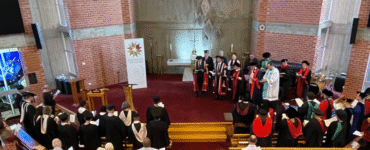Congratulations to our new graduates!
On Friday 1 December 2017, 6 students of the University graduated, with 4 receiving their award in person at a ceremony held in Perth. Each student attending was presented with a testamur by Deputy Chancellor, Reverend Dr Andrew Menzies.
The Graduation Address was given by the Reverend Tania Watson, Executive Minister, Churches of Christ in Western Australia. A copy of the address may be read below.
University of Divinity Graduation Address
The Platform
Friday 1 December 2017
Vice-Chancellor Professor Peter Sherlock, Principal Andrew Menzies, Creators of the Catalyst Programme: Josh Bond, Amit Khaira, Inaugural Graduands of Catalyst, Family & Friends:
It is significant that this graduation is taking place on a Friday night.
It was on a Friday that I joined the Catalyst Crew on the trip to Alice Springs.
It was on that Friday night we joined Jewish and Indigenous people over a memorable Sabbath meal. So I hope that you will allow me a moment of indulging in some “insider humour” as I commence my address tonight with the greeting: Shabbat Shalom!
To mark this Sabbath night, I come bearing a gift of Challah bread for each of the Graduands. In accordance with Jewish Passover tradition the gift of bread has been hidden. So you will need to go (after the ceremony) and seek this bread that gives life. Here is a clue … the one in whom all the fullness of peanut butter dwells … he will lead you to the bread!
With your challah bread you will find a blessing that I have composed for you.
I light this candle and pray this blessing over you and over the bread:
Blessed are you Eternal God, Creator of the Universe, who gives us eternal life through Christ Jesus our Lord.
Blessing of the Challah Bread:
Shabbat shalom!
May your life be as delicious as this challah bread;
- Sweet enough so that your face radiates the peace of Christ,
- Characterised by lightness and freshness from remaining in Christ,
- Twisted just enough to enough to keep you seeking the mind of Christ.
Now to the serious part of my reflections for you tonight.
Firstly I want to thank Dr Andrew Menzies and the Board and staff of Stirling Theological College for taking the risk to invest in the development of the Catalyst programme. On behalf of the WA Churches of Christ, I particularly want to say thank you for what this programme means, not just for this cohort of students, but for what it will mean for future students from amongst our family of churches.
I also want to congratulate Josh and Amit for their vision and drive and for the immense sacrifice that it has taken to shape and develop Catalyst. I am so proud of you both and of your amazing wives and personal supporters. Again, on behalf of the COCWA Churches and the broader community, thank you. I thank God for his work in you and through you and am inspired by you both. Your work gives me hope to keep pursuing my own work.
I am aware that there has been a lot of expectations upon Stirling and upon Josh & Amit to deliver Catalyst and for Catalyst to succeed.
I am also conscious that there is a level of expectation that has been placed upon the first cohort. I have heard it said many times: “There is a lot riding on this.” So I congratulate each of you for taking the risk to enrol and for the way in which you have all engaged deeply with the programme.
It’s important to name this sense of expectation tonight. To say, “Yes!” and celebrate the success of the first year of the Catalyst programme. Never-the-less, I also believe that it is important that we ‘name’ expectation and ponder the weight of expectation.
Expectations, whether they be realistic or unrealistic, are weighty realities. The weight of expectation can propel us to do well in life but we can just as easily be crushed or paralysed.
The weight of expectation is perhaps best summed up in this proverb: “To whom much is given, much is required.” Some of you may be feeling that people are watching you to see whether or not you will make the most of this amazing privilege of input from the Catalyst Team.
The problem with unmanaged or unconsidered expectation is that it can foster in us a short-term horizon. By this I mean the kind of thinking that says, “I have to get this right.” Fear of failure can cripple our capacity to make choices, to have a go, to fail and try something else, to be resilient and stick at things even if they don’t appear to be going well. Sadly, I think that this is how many people live. The result is settling for a “less-than kind of life” … we end up conforming to what life seems to dish out …
As young adults you are at the stage of life where you are making all kinds of decisions that will shape your life … career, faith, friends, marriage, family … you have many expectations to manage. Expectations that come from parents, teachers and the expectations that you have for yourself.
My encouragement is that you hold these expectations within the frame of “playing the long game” for life. To hold within yourself a vision that is bigger than, “What will I do next?” To have a vision for yourself that is big enough and kind enough so that you give yourself the best opportunity to flourish.
You may want to consider these questions:
- What kind of presence do I want to bring to people?
- What kind of impression do I want to leave with people?
- What kind of character do I want to forge over time?
- To hold as your highest focus; what is my spiritual ambition?
These kinds of questions will save you from the crushing weight of expectation. These questions will serve to create a sense of weight, or gravitas within your life. This is how we live out the Gospel … like Christ, our lives are meant to have weight, substance, gravitas … A life that has the weight of Christ about it is a life that sticks out in a superficial and shallow age.
As a young woman, a mentor changed my life simply because she taught me to dwell deeply in 2nd Timothy. My ambition was to memorize this letter so that I could emulate her example. Initially I had no idea how much absorbing Paul’s mentoring of Timothy would shape who I am. Today I am so grateful for how much of this letter informs who I am as a follower of Jesus.
In 2 Tim 2:1-7, Paul says to Timothy to consider life through the lens of a soldier, an athlete, a farmer. Paul finishes this section by saying, “Reflect on what I am saying. God will give you insight into all of this.”
That expression, “Reflect on what I am saying. God will give you insight into all of this,”
has been like grit in my soul for over 30 years. Lots of people give you advice and answers and life hacks … but the truth is that only you can determine how you will live your life in Christ. What Paul understood, and what I have come to understand, is that wrestling with the Word of God, reflecting deeply through the experiences of life and walking in Christ is work that we must do ourselves if we want to be people of substance who truly walk in freedom.
There is a haunting scene in Episode 3 of The Young Pope. Tired Cardinal Spencer, whose faith has been corrupted with power and ambition has all but given up. The weight of expectations that he has held for himself and for the church have all but crushed his soul. Aged Cardinal Caltanissetta slowly raises his shaky hand and as he does so Cardinal Spencer begins to sob uncontrollably.
“What’s he doing?’
“He’s lifting the weight of God.”
“And what is the weight of God like?
2 Corinthians 4:17, Paul speaks of an eternal weight of glory.
“The presence of God in our lives rests as a weight – not as a weight which oppresses us, but a weight which gives a centre and orients all things to itself.”[1] Every aspect of our lives is given its proper orientation and purpose as we relax into God’s presence and allow that weight to be the anchor of our souls.
Reflect on what I am saying. The Lord will give you insight into all of this.





